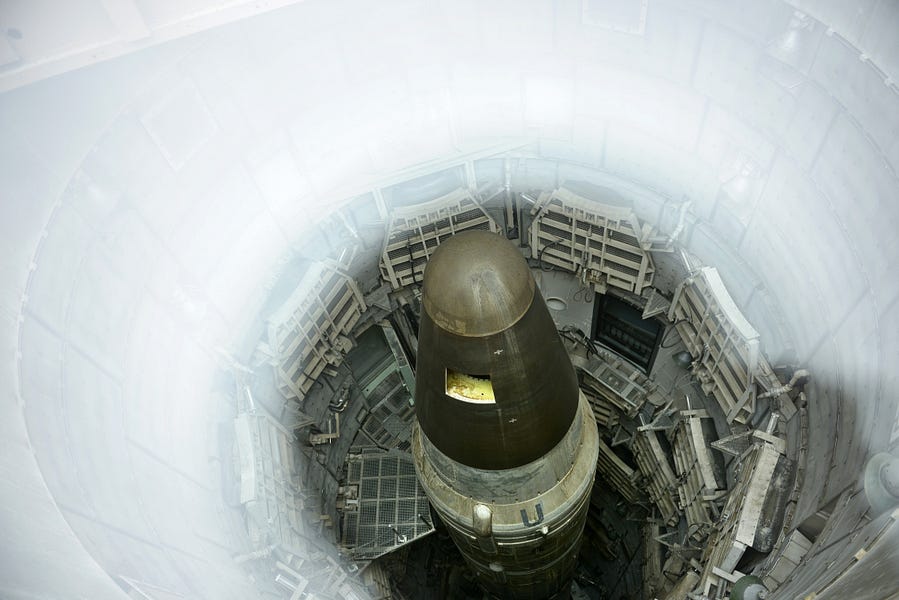A few days before the 2008 election, Defense Secretary Robert Gates gave a speech at the Carnegie Endowment for International Peace about nuclear weapons. His remarks were part explanation, part warning.
Even as the United States sought to reduce its nuclear arsenal, and insisted others do the same, he argued, it would be important to maintain a robust, modernized nuclear capability to serve as a deterrent to potential bad actors. In language meant to sound alarms, Gates made his case forcefully.
“The problem is the long-term prognosis, which I would characterize as bleak. No one has designed a new nuclear weapon in the United States since the 1980s, and no one has built a new one since the early 1990s. The U.S. is experiencing a serious brain drain in the loss of veteran nuclear weapons designers and technicians. Since the mid-1990s, the National Nuclear Security Administration has lost more than a quarter of its workforce. … Our nuclear weapons were designed on the assumption of a limited shelf life and that the weapons themselves would eventually be replaced. Sensitive parts do not last forever. At a certain point, it will become impossible to keep extending the life of our arsenal.”
Rogue regimes like North Korea and Iran were seeking the bomb, Gates explained, and nuclear states like Russia and China were working hard to modernize and improve their existing capabilities.
“To be sure, we do not consider Russia or China as adversaries, but we cannot ignore these developments and the implications they have for our national security,” said Gates. And then, moments later: “Our nuclear arsenal is vital for a final reason I mentioned earlier: We simply cannot predict the future. Who can tell what the world will look like in 10 to 20 years?”
Here we are, 11 years on. North Korea has nuclear weapons. Iran is racing quickly toward weapons of its own. Russia and China have upgraded their nuclear capabilities and are now widely considered adversaries.
The only thing that’s changed is the increased urgency of such modernization efforts. Gen. Mark Milley, chairman of the Joint Chiefs of Staff, was asked during his confirmation hearing last July about his top priorities related to Russia and China: “I think the very No. 1 for me and No. 1 stated for the Department of Defense is the modernization, recapitalization of the nation’s nuclear triad. I think that’s critical.”
And yet, the exigent call from Gates for the reinvigoration and modernization of the U.S. nuclear weapons program has gone largely unanswered. “We’ve had our chin right at the waterline, just able to get oxygen for two decades,” says a senior Republican aide. There have been many distractions, other priorities. “We had a decade of the peace dividend in the ‘90s, a decade of war on terror conflict after that, and most recently, a decade of the budget control act. Now, we have to do so many things at once that it’s overwhelming. This is supposed to be the most important mission that we’ve got and it’s not being treated that way.”
The question of nuclear modernization is at the heart of a bitter funding dispute ahead of the final 2021 federal budget from the White House, expected February 11. On one side is Lisa Gordon-Hagerty, the under secretary of energy for nuclear security and administrator of the National Nuclear Security Administration (NNSA), and virtually every Republican on the House and Senate Armed Services committees. On the other is Russ Vought, director of the Office of Management and Budget, and White House chief of staff, Mick Mulvaney. At issue is an estimated $16.3 billion in funding for four years to secure, maintain, and modernize America’s nuclear arsenal, including $2.5 billion in fiscal year 2021.
The NNSA is housed in the Department of Energy, one of two federal agencies with responsibility for the U.S. nuclear weapons program. The other is the Department of Defense. A recent Congressional Research Service report describes how those responsibilities are divided. “Responsibility for U.S. nuclear weapons resides in both the Department of Defense (DOD) and the Department of Energy (DOE). DOD develops, deploys, and operates the missiles and aircraft that deliver nuclear warheads. It also generates the military requirements for the warheads carried on those platforms. DOE, and its semiautonomous National Nuclear Security Administration (NNSA), oversee the research, development, testing, and acquisition programs that produce, maintain, and sustain the nuclear warheads.”
Last fall, Gordon-Hagerty submitted a strategy-driven budget request of $19.96 billion for 2021. The White House’s budget office directed NNSA to cut that total to $18.6 billion and then White House budget hawks cut it further to $17.487 billion. On December 16, Gordon-Hagerty wrote an urgent memo to Dan Brouillette, the secretary of energy, who was sworn in just days earlier, pleading for the $20 billion topline number. The Dispatch obtained a copy of the memo, which runs 11 pages.
After years of underfunding, Gordon-Hagerty wrote, failing to fully fund NNSA would “seriously risk the nation’s deterrent capability, and put at risk the nation’s status as a superpower. … Reductions of this magnitude bring into question our ability to provide a safe and secure and effective nuclear deterrent. At this level of funding, NNSA will need to reduce the size and composition of the stockpile almost immediately.” [Emphasis added]
There is no longer time to put off the long-needed improvements, she argued in the memo.
“We have been at a tipping point for years and we will begin managing to failure many parts of the nuclear security enterprise. This reduction will directly reduce the effectiveness of the nuclear deterrent and is essentially unilateral disarmament by the United States of America. … A budget of $17.487 billion with a 2.1 percent increase for four years is a $16.3 billion shortfall and will cut NNSA’s modernization program in half. These reductions do not meet the commitments of the policies set forth in the 2018 Nuclear Posture Review, 2017 National Security Strategy and Nuclear Weapons Council requirements.”
Gordon-Hagerty’s memo was not well-received. According to three sources with knowledge of the matter, her appeal was rejected and she was instead told by Brouillette (among others) to sign a letter endorsing the lower amount and offering assurances that the NNSA mission could be achieved despite the lack of resources. She was being asked, in effect, to lie. She refused.
Vought and others are insisting on the lower numbers in order to comply with the restrictions of the Bipartisan Budget Act of 2019. That piece of legislation replaced the earlier Budget Control Act of 2011, responsible for the tight restrictions on both discretionary spending, both defense and non-defense. While the BBA raised the hard caps of the earlier BCA, it didn’t eliminate them. So those putting together the fiscal year 2021 budget have to operate within the new guidelines and such budgeting requires tradeoffs. But can we afford once again to back-shelf nuclear modernization?
Now, Congress has gotten involved. On January 16, 12 Republican senators wrote to Trump requesting a meeting on the cuts. The lawmakers expressed concern that warhead programs would be “irreversibly delayed,” that the B83 bomb would have to be retired early, that NNSA would be unable to meet the demand for 80 plutonium pits—the core of some nuclear warheads—per year through 2030, and that funds for future nuclear research would have to be repurposed to maintain crumbling nuclear infrastructure around the country. The signers include Sen. Jim Inhofe, chairman of the Senate Armed Service Committee, Sen. Jim Risch, chairman of the Senate Foreign Relations Committee, and Sens. Lindsey Graham, Tom Cotton, Ted Cruz, Tim Scott, and John Cornyn, among others. A House version of the same letter went out the following day, including signatures from Reps. Mac Thornberry, Mike Turner, Liz Cheney, Mike Gallagher, Michael Waltz, and Elise Stefanik.
Several lawmakers have spoken directly to Trump about the NNSA budget dispute. In conversations about the funding, Trump, who has publicly committed to modernizing the nuclear arsenal and boosted funding in his first three years, has expressed frustration that NNSA increases are being blocked. OMB has told members of Congress that NNSA will be “fully funded” at the lower amount, disputing Gordon-Hagerty’s memo as inaccurate.
Rep. Michael Waltz, a Republican from Florida and former Green Beret, supports modernization as a first step but argues there’s much more to be done. “It’s out there publicly that China is looking to double the size of their nuclear fleet. Putin didn’t get the memo that the Cold War is over and Russia is making some very targeted, very dangerous first strike investments. The Chinese are very quietly and very determinedly developing nuke capabilities across the board. Submarine, stealth, they’re looking to double ICBM. America may not believe we’re in a Cold War with China but they believe it—certainly President Xi does.”
Sen. Tom Cotton, who signed the letter to Trump, praised the administration’s efforts thus far and warned against further reductions from the NNSA request. “The president and his administration have rightly prioritized nuclear modernization after three decades of neglect. Officials have testified that the nuclear triad is our military’s most important mission. We expect that we will receive a budget that fully meets all of the nuclear enterprise’s needs. Anything less is unacceptable.”
Rep. Liz Cheney, chairwoman of the House GOP conference and a signer of the letter, urged a quick resolution. “Modernizing America’s nuclear forces is crucial to our security. Our adversaries, including Russia and China, are making strides that threaten to overcome the superiority and effectiveness of our nuclear deterrent. President Trump has been clear about his commitment to fully funding NNSA at $20 billion this year with sufficient increases in following years. This shouldn’t even be a debate.”
But it is a debate, for now, and unless Trump weighs in, the U.S. risks falling even further behind.
Photograph of a a deactivated Titan II nuclear ICMB in a silo at the Titan Missile Museum in Green Valley, Arizona by Brendan Smialowski/AFP via Getty Images.







Please note that we at The Dispatch hold ourselves, our work, and our commenters to a higher standard than other places on the internet. We welcome comments that foster genuine debate or discussion—including comments critical of us or our work—but responses that include ad hominem attacks on fellow Dispatch members or are intended to stoke fear and anger may be moderated.
With your membership, you only have the ability to comment on The Morning Dispatch articles. Consider upgrading to join the conversation everywhere.